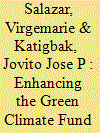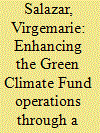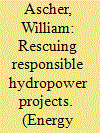|
|
|
Sort Order |
|
|
|
Items / Page
|
|
|
|
|
|
|
| Srl | Item |
| 1 |
ID:
180640


|
|
|
|
|
| Summary/Abstract |
Climate change is a leading threat to sustainable socio-economic development in Bangladesh. Adverse impacts of climatic disasters including flash floods, recurrent cyclones and erratic rainfall patterns are already causing hardship for both rural and urban people and are expected to accelerate into the future. The aim of this research note is to identify the core contributing economic sectors to climate change in Bangladesh, and to consider effective mitigation strategies. Following the 5th Assessment Report (AR5) of the Intergovernmental Panel on Climate Change (IPCC) report (2014), in this paper, we argue that comprehensive mitigation measures are required in the energy, transport, buildings, industry and land-use sectors to reduce Greenhouse Gas (GHG) emissions. Our findings indicate that it is crucial that government and non-government mitigation efforts engage with community knowledge practices in order to most effectively reduce GHG emissions and combat the adverse impacts of climate change.
|
|
|
|
|
|
|
|
|
|
|
|
|
|
|
|
| 2 |
ID:
188906


|
|
|
|
|
| Summary/Abstract |
The prevailing issues in the Green Climate Fund on implementation and governance can be seen as symptoms of the ills of the international climate finance architecture. These are compounded by the inadequate financial support provided by developed countries to developing countries and the low volume of funding channelled to adaptation projects. Evidently, the cited issues highlight the need to fully integrate the principles of justice and equity into the global climate change regime. Thus, this policy brief discusses the key challenges related to climate finance, and outlines several options and considerations on improving the Green Climate Fund operations using a climate justice lens. This paper intends to take a more normative and ethical discussion on the topic of climate finance.
|
|
|
|
|
|
|
|
|
|
|
|
|
|
|
|
| 3 |
ID:
188916


|
|
|
|
|
| Summary/Abstract |
The prevailing issues in the Green Climate Fund on implementation and governance can be seen as symptoms of the ills of the international climate finance architecture. These are compounded by the inadequate financial support provided by developed countries to developing countries and the low volume of funding channelled to adaptation projects. Evidently, the cited issues highlight the need to fully integrate the principles of justice and equity into the global climate change regime. Thus, this policy brief discusses the key challenges related to climate finance, and outlines several options and considerations on improving the Green Climate Fund operations using a climate justice lens. This paper intends to take a more normative and ethical discussion on the topic of climate finance.
|
|
|
|
|
|
|
|
|
|
|
|
|
|
|
|
| 4 |
ID:
166523


|
|
|
|
|
| Summary/Abstract |
In recent years, the climate funds stood out as tool to counter the climate change and its environmental impact financing adaptation. Moreover they represent an instrument to promote practices to support the developing countries in their path towards the sustainability.
|
|
|
|
|
|
|
|
|
|
|
|
|
|
|
|
| 5 |
ID:
137269


|
|
|
|
|
| Summary/Abstract |
Institutional mechanisms for administering international climate finance constitute key components of an effect global climate regime, and the Green Climate Fund represents what promises to become the most important such mechanism. As the Fund begins to serve its function of transferring economic resources from developed to developing countries to support mitigation and adaptation activities, it faces several obstacles. Since contributions to the Fund by states or private parties are voluntary, they are not necessarily based on the UN Framework Convention on Climate Change’s “common but differentiated responsibilities” principle. Its governing instrument also departs from UNFCCC principles. In addition, the Fund faces a significant ambition gap in pledges to fund its operations. By instantiating several informal means of applying climate justice norms to assessments of national contributions to climate finance, some of this resistance might be overcome, increasing support for the Fund and, with this, increasing prospects for reaching consensus on a new climate treaty architecture at COP 21.
|
|
|
|
|
|
|
|
|
|
|
|
|
|
|
|
| 6 |
ID:
149888


|
|
|
|
|
| Summary/Abstract |
This article presents a detailed review and analysis of the discussions around the new market mechanism (NMM) and explores its potential in China. It contributes to the current discussion of the NMM in three aspects. First, this article attempts to streamline ideas about the NMM. The term NMM is considered to be an umbrella concept for emission trading systems which all Parties can engage in on a voluntary basis in the implementation of their intended nationally determined contributions, and which need to satisfy three criteria: (i) having a large scale scope; (ii) aiming to facilitate a net emission reduction; (iii) allowing flexibility for the host country. We also present a framework to clarify the NMM. Based on this framework, major options with a high implementation potential are identified. Second, we argue that the national-level operational framework determines the chance of successful implementation of the NMM. We identify different options based on a literature survey and evaluate them with respect to effectiveness and efficiency. Third, we choose China, a highly influential country regarding climate change polices, as a case to analyze the potential contributions and challenges of the NMM and its implementation at different stages of national development.
|
|
|
|
|
|
|
|
|
|
|
|
|
|
|
|
| 7 |
ID:
175813


|
|
|
|
|
| Summary/Abstract |
How do powerful states control international organizations (IOs)? In contrast to the conventional wisdom that treats weighted voting rules as the primary means that powerful states use to codify their asymmetric control in institutional design, we propose that funding rules are equally important. Our framework develops a logic of substitution whereby permissive earmark rules—that allow donors to stipulate how their contributions to an IO are used—are a design substitute for weighted voting from wealthy states’ perspective. Whether asymmetric control is incorporated in design through voting or funding rules depends on whether egalitarian norms emphasizing political and legal equality, or shareholder norms emphasizing influence commensurate with financial power, govern voting and representation rights at the IO. Focusing on the domain of climate finance, we demonstrate that weighted voting rules are used at international climate finance institutions (ICFIs) associated with multilateral development banks, but that wealthy states pursued permissive earmark rules at ICFIs within the United Nations system where egalitarian norms are strong. In this way, powerful donors can exert control over resource allocation even when developing states appear to hold equal influence on governing bodies. In addition to providing a reassessment of how power translates into control at IOs, our framework offers insight into forum-shopping behavior and sheds light on substitution dynamics that involve other dimensions of design across a range of issue areas.
|
|
|
|
|
|
|
|
|
|
|
|
|
|
|
|
| 8 |
ID:
177429


|
|
|
|
|
| Summary/Abstract |
Given the still-growing use of coal and natural gas in generating electricity in many developing countries, it is necessary to put far more effort into promoting responsible large-scale hydropower projects. In contrast to hydro, solar and wind power face physical constraints that greatly limit their potential to replace fossil-fuel sources of power generation. Because designing hydro projects to reduce their socio-economic and environmental damage typically entails greater costs and/or lower capacity, subsidies are needed to increase the number of responsible, economically viable projects. Despite the past abuses, hydro offers low-carbon energy generation, low-cost power generation, and important potential for energy storage and peaking supply to supplement intermittent low-carbon sources such as wind and solar. The promotion of responsible hydropower requires greater awareness of the possibilities for responsible projects, greater overall climate funding, better provision for local participation and compensation, changes in the doctrines of additionality, and stronger institutions to identify, design, and broker these projects.
|
|
|
|
|
|
|
|
|
|
|
|
|
|
|
|
|
|
|
|
|